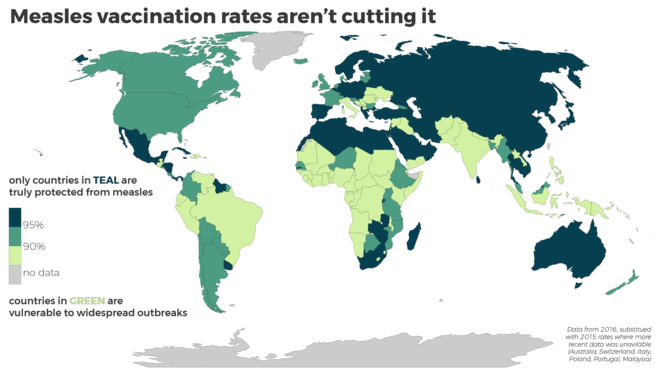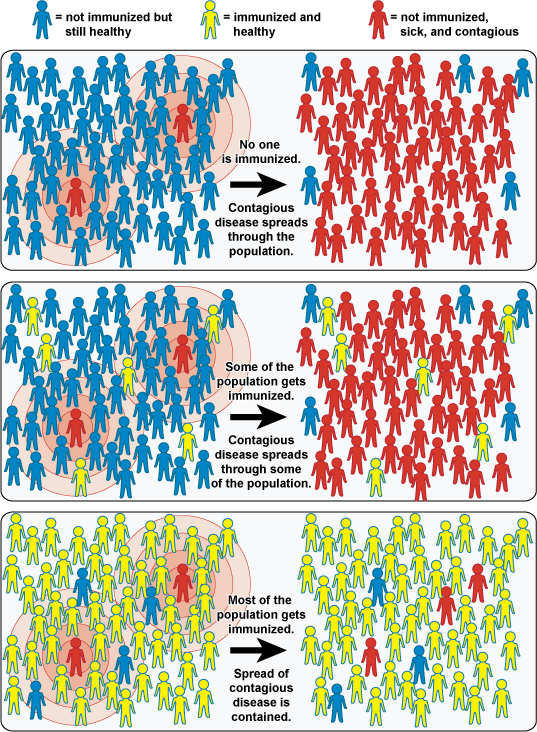Measles update 2018: Children are hit the hardest
By Susan Burke March
November 6, 2018 — CNN reports that 17 children in the Orthodox Jewish community in the Williamsburg and Borough Park neighborhoods in Brooklyn, New York have been diagnosed with measles. Infected children range from just seven months to four years — many hospitalized with complications.
children range from just seven months to four years — many hospitalized with complications.
As of Sunday, November 11, Israel’s Ministry of Health counted 1,334 measles patients, including a toddler who died from the illness last week. The ministry believes that the disease was imported by tourists and visitors who infected an unvaccinated population, largely among the nation’s ultra-Orthodox Jewish communities.

World Health Organization. Number of reported measles cases by country (from September 2017 to February 2018)
The Independent in the U.K. reported in May that more than 41,000 cases of measles have been reported in the first six months of 2018, with 23,000 in the Ukraine alone.
The CNN report indicates that the number of cases in the Ukraine is 31,000 with 14 deaths. Serbia reports 15 deaths from measles.
As of October 5, most of the cases in the EU were reported from Romania (5,088 cases, with 33 deaths), France (2,702, with 3 deaths), Greece (2,289 cases, with 2 deaths) and Italy (2,248 cases, with 6 deaths).
Outbreaks continue to affect Greece, Ireland, Romania and Slovakia, according to the European Center for Disease Prevention and Control (ECDC).

Serious complications are more common in children under the age of 5, or adults over the age of 30. The most serious complications include blindness, encephalitis (an infection that causes brain swelling), severe diarrhea and related dehydration, ear infections, or severe respiratory infections such as pneumonia.
Measles (en español, el sarampión) is a potentially deadly and highly contagious viral disease. According to the World Health Administration (WHO), measles remains an important cause of death among young children globally, despite the availability of a safe and effective vaccine.
According to Popular Science, before the measles vaccine existed, 9 out of every 10 kids got the disease before age 15. Two million people died from it every year. It’s easy for most of us to forget that because we’ve had an effective measles vaccine since 1960.
Measles is transmitted via droplets from the nose, mouth or throat of infected persons. According to the National Foundation for Infectious Diseases, you can get the measles just by being in the same room with an infected person — it’s that contagious — unless you’ve been vaccinated or you’ve acquired immunity by having had the measles.
Symptoms of measles include high fever, generalized rash, runny nose, pink, watery eyes, coughing, diarrhea, and earache. The average time between exposure to the measles virus and development of symptoms is usually 10 to 12 days but can range from as few as seven days to as many as 21. A rash develops, starting on the face and upper neck and gradually spreading downwards.
This past May 2018, El Mercurio reported a confirmed case of the measles in Cuenca. An 18-month-old child (not from Ecuador) had contracted measles before coming to Ecuador.
Cuenca’s Ministry of Health recommended at that time that all children under age seven and in addition all children from Venezuela and from Columbia under age 15 be vaccinated for measles.
At the time, my husband and I were just arriving home from a trip to Ecuador’s beach while our home-exchangers were staying in our apartment. Our apartment/hotel manager called me. “Are you upstairs in your apartment? The Ministry of Health is here offering immunization against the measles.” The representatives from the Ministry of Health were visiting places where they knew foreigners were staying, such as hotels, to offer them a free immunization against the measles. Our exchangers told the hotel receptionist that they had been vaccinated in New Zealand. No problem, no vaccination necessary.
My husband and I (and many of our friends) took advantage of the free immunization last May. Did we have the measles as kids? Uh… yes? No? Gee, that was so long ago! Let’s get the vaccine! Está libre. Todo bien.
In 2017 there were 173,330 reported cases, and about 90,000 deaths from measles globally. But before the measles vaccine became widely available, there were 2.6 million measles deaths per year — and this is where there were far fewer humans on the planet Earth. The risk of death from measles is higher for adults and infants than for children. In the U.S. the outbreaks of measles in 2008 and 2011 primarily affected those who were not vaccinated with the MMR (measles-mumps-rubella) vaccine

Worldwide, the vaccination rate has plateaued at 85 percent, and that’s due in part to countries stagnating or even slipping on the progress they were making. Credit: Popular Science
Popular Science reports, “The Sixth Meeting of the European Regional Verification Commission for Measles and Rubella Elimination reported in June 2017 that “progress toward global elimination of measles has slowed” and that “progress towards regional elimination targets is off track.” Less than two out of every three member countries had measles vaccination coverage above 90 percent, and even fewer made it above the recommended 95 percent threshold. Because symptoms don’t appear for a week or so after infection, patients have plenty of time to spread the highly contagious virus around before doctors know to quarantine them. So to keep a population safe from measles, you need nearly everyone to be vaccinated. Even with most of Europe above the 90 percent mark for more than a decade now, there are still large outbreaks every year.”
Dr. Jaime Moreno is an internist practicing medicine at the Consultorios Santa Ines. At the time of the May measles case, he had not heard of a case of measles in Cuenca in more than 30 years. However, when he was a medical student in Cuenca the late 1970s he saw many cases of measles, with dire consequences.

Photo source: The Times of Israel
Measles can have permanent disabling ramifications including pneumonia, brain inflammation, and middle-ear infection. Pregnant women who contract the measles incur a significant risk for miscarriage and low birth weight infants. As Dr. Moreno says, the success of the vaccination campaigns in Ecuador is obvious. In Cuenca, measles is an extremely rare disease.
Safety and efficacy
The measles vaccine has been in use since the 1960s. It is safe, effective and inexpensive. WHO recommends immunization for all susceptible children and adults for whom measles vaccination is not contraindicated.
Popular Science writes,
“It’s so easy to forget what it was like when most children got the measles. Millions of people worldwide feel it’s not a priority to vaccinate their kids, probably in part because they can’t fathom a world where parents regularly lose children to the measles. But such a reality is not improbable, and we are only a couple generations removed from it.
Roald Dahl—famous children’s author—lost his own daughter, Olivia, to measles when she was seven and wrote a letter to every parent in 1986:
As the illness took its usual course I can remember reading to her often in bed and not feeling particularly alarmed about it. Then one morning, when she was well on the road to recovery, I was sitting on her bed showing her how to fashion little animals out of colored pipe-cleaners, and when it came to her turn to make one herself, I noticed that her fingers and her mind were not working together and she couldn’t do anything.
“Are you feeling all right?” I asked her.
“I feel all sleepy, ” she said.
In an hour, she was unconscious. In twelve hours she was dead.
It really is almost a crime to allow your child to go un-immunized.
The overwhelming majority (more than 95%) of measles deaths occur in populations with low per capita incomes and weak health infrastructures. Reaching all children with two doses of measles vaccine, either alone, or in a measles-rubella (MR), measles-mumps-rubella (MMR), or measles-mumps-rubella-varicella (MMRV) combination, should be the standard for all national immunization programs.
Currently, the campaign is in force to vaccinate all children against this preventable disease in Cuenca. Free vaccinations are available at any Ministerio de Salud Health Center. I visited the busy clinic on 12 de Abril near Parque de la Madre today, and they confirmed it is available for children. For adults who have not previously had measles, or the vaccination, it will be available in December. Just say, “Yo quiero la vacuna contra el sarampión, por favor.” They will also have influenza vaccinations available in December as well.

Even a small number of unvaccinated people can make it much easier for a disease to spread and survive. There is a concept in science called “herd immunity,” which refers to the idea that a lot of people need to get a given vaccine, whether it’s for the flu or measles, to stop a disease from spreading. Vaccinated people essentially act as barriers to outbreaks, since diseases can’t pass through them and infect others.
Read my earlier 2018 columns on health and vaccinations.
Vaccines: The myths, facts, and foolishness, continued …
What was life like before vaccines? Part III
Sources
National Foundation for Infectious Diseases. Facts about Measles for Adults.
Popular Science. Thanks, anti-vaxxers: Measles is on the rise in Europe.
World Health Organization. Immunization, Vaccines and Biologicals.
World Health Organization. Measles.
Susan Burke March, a Cuenca expat, is a Registered Dietitian Nutritionist and a Certified Diabetes Educator who specializes in smart solutions for weight loss and diabetes-related weight management. She is the author of Making Weight Control Second Nature: Living Thin Naturally — a fun and informative book intended to liberate serial dieters and make healthy living and weight control both possible and instinctual over the long term. Do you have a food, nutrition or health question? Write to her – SusanTheDietitian@gmail.com






















